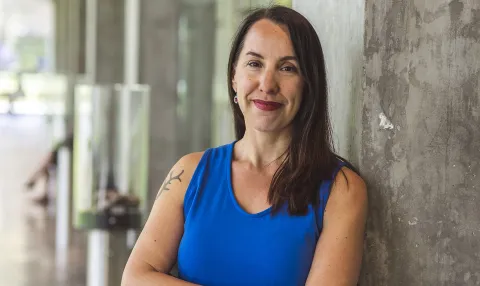“I have learned to believe in my own self-worth, to speak my truth and support those who are doing important and challenging frontline work in, and for, Indigenous communities.”

Lyana Patrick
- Degree:
- Doctor of Philosophy
- Grad year: 2019
- Program:
- Campus: Vancouver
I am Dakelh from the Stellat’en First Nation in central British Columbia, and Acadian/Scottish on my mother’s side. My research contributes to the growing academic field of Indigenous Community Planning by looking at the planning and policy implications of planning with and for urban Indigenous communities. I have always been interested in relational approaches to teaching and research and through my doctoral work have been able to more clearly describe such an approach as a core value of Indigenous community planning. I’ve been fortunate to have my research funded through a Vanier Canada Graduate Scholarship, and in the last year of my studies to be supported through a UBC Indigenous Doctoral Completion Scholarship. I also received funding through the Liu Scholars Program to co-create a multi-media exhibit called “The Suitcase” with fellow scholar Ashli Akins that allowed us to explore collaborative arts-based public scholarship. I am honoured to be the first Indigenous PhD graduate from the School of Community and Regional Planning.
Why did you choose community and regional planning?
I chose the SCARP program for my doctoral studies because I was interested in an expansive approach to community health and well-being. I thought that planning would be a productive and welcoming environment in which to explore Indigenous perspectives on planning and health. I also believed I had a contribution to make as an interdisciplinary scholar interested in bringing diverse fields of study into conversation with one another.
What have you learned in the SCARP graduate program that is most valuable?
Through my time at SCARP, I have been fortunate to learn from a wide range of practitioners, scholars, community members, leaders, and students whose passion and knowledge have inspired me to continue down the academic path. Through these experiences, I have made life-long connections that will continue to inspire and motivate my work. My experience at SCARP has re-affirmed the importance of creating strong, supportive networks of friends and allies. I have learned to believe in my own self-worth, to speak my truth and support those who are doing important and challenging frontline work in, and for, Indigenous communities.
What has been your most memorable/valuable non-academic experience studying community and regional planning at UBC?
I was fortunate to sit on the Canadian Institute of Planners Indigenous Community Planning advisory committee. I learned so much from incredible colleagues across the country and had the opportunity to help shape policy on planning practice and reconciliation with Indigenous peoples. This is historic and important work and I was honoured to be a part of that process.
What advice would you give a student considering graduate studies in community and regional planning?
I would encourage anyone considering graduate studies in community and regional planning — especially Indigenous students — to make sure you have a strong support network in place, talk to former students, meet with faculty members and get to know the opportunities and resources that are available. Graduate work can be intense so being as prepared as you can and having a strong base of support will help you push through the challenges and succeed in graduate studies.